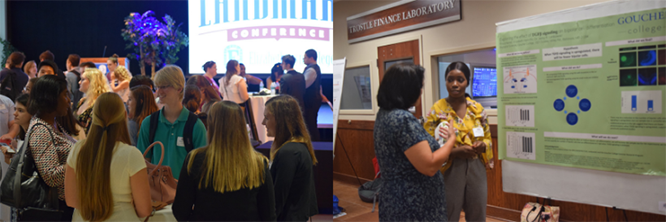Event Title
Location
Poster Presentations
Department
Biology
Start Date
11-7-2019 1:30 PM
End Date
11-7-2019 2:30 PM
Description
The campus of Elizabethtown College possesses various ecosystems that frequently are overlooked by the student body and community. These ecosystems include forests, meadows, wetlands, streams, and ponds and provide habitat for a variety of plants and animals. We are advocating for the college to recognize these campus areas as the “Natural Lands of Elizabethtown College.” The goal of our project was to determine what species inhabit these natural lands. Our primary taxonomic focus was on birds. We determined the absence and presence of bird species common to the eastern United States. About three times a week for three weeks in late May and early June of 2019, we birded in seven locations for 15-minute intervals. These locations included meadow, wooded, pond, and residential ecosystems. We determined the probabilities of occupancy and detection of birds within these ecosystems. In addition to birds, we also surveyed for salamanders and aquatic macroinvertebrates in streams on campus. We also mapped patches of milkweed on campus in anticipation of future research on monarch butterflies. These data on various taxonomic groups are a first step to understanding the biodiversity of the “Natural Lands.” The Natural Lands of Elizabethtown College will demonstrate our college’s commitment to preserving biodiversity and providing opportunities for the educational, physical, and mental well-being of students by creating connections with nature.
Recommended Citation
Fegley, Caroline and Mohn, Aprille, "Biological Survey of Elizabethtown College" (2019). Landmark Conference Summer Research Symposium. 25.
https://jayscholar.etown.edu/landmark/2019/july11/25
Included in
Biological Survey of Elizabethtown College
Poster Presentations
The campus of Elizabethtown College possesses various ecosystems that frequently are overlooked by the student body and community. These ecosystems include forests, meadows, wetlands, streams, and ponds and provide habitat for a variety of plants and animals. We are advocating for the college to recognize these campus areas as the “Natural Lands of Elizabethtown College.” The goal of our project was to determine what species inhabit these natural lands. Our primary taxonomic focus was on birds. We determined the absence and presence of bird species common to the eastern United States. About three times a week for three weeks in late May and early June of 2019, we birded in seven locations for 15-minute intervals. These locations included meadow, wooded, pond, and residential ecosystems. We determined the probabilities of occupancy and detection of birds within these ecosystems. In addition to birds, we also surveyed for salamanders and aquatic macroinvertebrates in streams on campus. We also mapped patches of milkweed on campus in anticipation of future research on monarch butterflies. These data on various taxonomic groups are a first step to understanding the biodiversity of the “Natural Lands.” The Natural Lands of Elizabethtown College will demonstrate our college’s commitment to preserving biodiversity and providing opportunities for the educational, physical, and mental well-being of students by creating connections with nature.




Comments
Faculty Mentor: David Bowne, Elizabethtown College